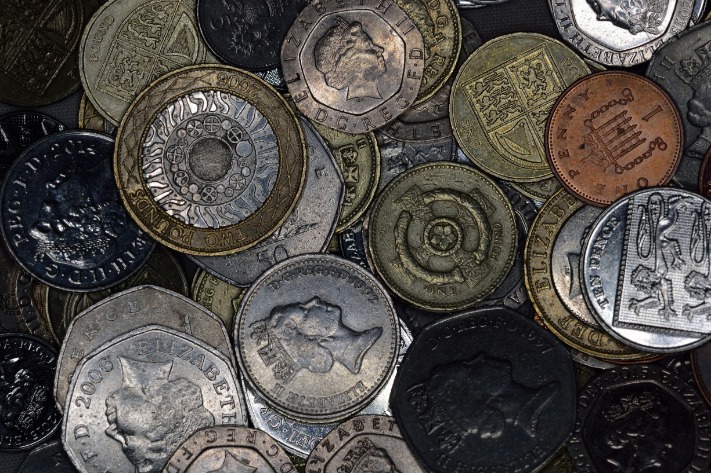Historical Exchange Rate Trends
The exchange rate between the British Pound and the Nigerian Naira has experienced significant fluctuations over the years, reflecting broader economic, political, and global financial trends. Understanding these historical movements provides valuable insights into the factors influencing currency stability and the flow of investments between the two nations.
Pre-Independence Era
During the Pre-Independence Era, the exchange rate between the British Pound and the Nigerian Naira was influenced heavily by colonial economic policies and the magnetic importance of the British economy. The British Pound was the dominant currency in Nigeria, which was then a British colony, and its value remained relatively stable compared to the local currency, serving as a benchmark for economic transactions. However, fluctuations occurred due to global economic shifts, colonial trade dynamics, and the gradual buildup toward independence. These exchange rates were often managed by colonial authorities to facilitate trade and economic stability within the region, but they also reflected the broader economic relationship between Britain and its Nigerian colony. As Nigeria moved closer to independence, the exchange rate began to experience more variability, influenced by the changing political landscape and economic policies enacted to prepare for a post-colonial financial system.
Post-Independence Developments
Following Nigeria’s independence in 1960, the exchange rate between the British Pound and the Nigerian Naira experienced significant fluctuations driven by economic policies, political stability, and external influences. Initially, the Naira was pegged to the Pound to stabilize the newly independent country’s economy, reflecting strong colonial ties. Over the decades, this rate saw periods of stability interspersed with sharp devaluations, particularly during economic crises and banking reforms. The 1970s and 1980s marked a transition towards more flexible exchange rate policies, influenced by global economic changes and Nigeria’s pursuit of diversification away from oil dependence. Post-independence developments included shifts from fixed to floating exchange rates, currency devaluations to boost exports, and interventions by the Central Bank of Nigeria to curb inflation and stabilize the Naira. These evolving policies have shaped the long-term trends of the Pound-to-Naira exchange rate, reflecting Nigeria’s broader economic trajectory and its integration into the global financial system.
Currency Convertibility and Policy Changes
Historical exchange rate trends between the British Pound and the Nigerian Naira have been influenced by various economic, political, and global factors over the years. Periods of stability often correspond with sound fiscal policies and strong economic fundamentals, while fluctuations tend to align with political instability or external shocks. Currency convertibility between these two currencies has experienced changes, especially as Nigeria has implemented different foreign exchange policies aimed at managing its economy and stabilizing its currency. Over time, policy changes such as foreign exchange restrictions, devaluation efforts, and the introduction of multiple exchange rate regimes have significantly impacted the ease with which the Naira can be converted into Pounds. These policy shifts reflect Nigeria’s attempts to balance inflation, foreign reserves, and economic growth while adapting to external economic pressures, influencing the overall trajectory of the exchange rate trend between the British Pound and the Nigerian Naira.
Major Fluctuations in the 20th Century
The exchange rate between the British Pound (GBP) and the Nigerian Naira (NGN) has experienced significant fluctuations throughout the 20th century, reflecting broader economic and political changes in both countries. In the early 20th century, the GBP was relatively stable, bolstered by the British Empire’s global influence. However, major fluctuations began to emerge during periods of economic crisis and political upheaval. The Great Depression of the 1930s led to a decline in the pound’s value, impacting its exchange rate with the Naira, which was then under colonial rule. Post-World War II, the pound faced persistent devaluation pressures, culminating in the British currency crisis of 1967. The 1970s marked a period of intense volatility, with the pound experiencing significant devaluations, particularly after the UK abandoned the Bretton Woods system in 1971, leading to floating exchange rates. Meanwhile, Nigeria’s economy was also fluctuating due to political instability, oil booms, and busts, all influencing the Naira’s exchange rate against the pound. The oil crises of the 1970s caused abrupt shifts, and the introduction of numerous devaluations in the 1980s further heightened exchange rate instability. These major fluctuations in the 20th century set the stage for the more volatile and complex exchange rate dynamics seen in the following decades, shaping the economic relationship between the UK and Nigeria.
Factors Influencing GBP to NGN Exchange Rate
The exchange rate between the British Pound (GBP) and the Nigerian Naira (NGN) is influenced by a variety of economic, political, and social factors. Understanding these elements is essential for investors, travelers, and policymakers to make informed decisions. Fluctuations in the GBP to NGN rate can be driven by changes in currency demand, national economic conditions, and geopolitical events, among other influences.
Economic Indicators
The exchange rate between the British Pound (GBP) and the Nigerian Naira (NGN) is significantly influenced by various economic indicators that reflect the overall health and stability of both economies. Key factors include inflation rates, interest rates, and gross domestic product (GDP) growth, which impact investor confidence and currency demand. For instance, high inflation in Nigeria can lead to a depreciation of the Naira, while stable inflation in the UK tends to strengthen the Pound.
Interest rates set by the central banks of the UK and Nigeria also play a crucial role. Higher interest rates in the UK can attract foreign investment, increasing demand for GBP and causing its value to rise against the NGN. Conversely, if Nigeria’s central bank lowers interest rates, it may weaken the Naira due to reduced foreign investment and capital outflows.
Economic indicators like trade balances and foreign reserves are also vital. A trade surplus in Nigeria, with higher exports than imports, can bolster the Naira, whereas a trade deficit may weaken it. Additionally, Nigeria’s substantial foreign reserves influence the central bank’s ability to stabilize the Naira through interventions.
Overall, these economic indicators collectively shape market perceptions and currency valuations, determining the fluctuating exchange rate between the British Pound and the Nigerian Naira. Monitoring these indicators helps understand the currency movements and potential future trends in GBP to NGN exchange rates.
Political Stability and Governance
Political stability and governance play a crucial role in determining the GBP to NGN exchange rate. When Nigeria experiences political stability, it fosters investor confidence, attracting foreign direct investments and improving the country’s economic outlook. Strong governance, characterized by transparent policy-making and effective institutions, further enhances economic stability, which positively influences currency exchange rates. Conversely, political turmoil, corruption, or inefficient governance can lead to economic uncertainty, depreciating the Naira against the British Pound. Investors often view political risks as potential threats to their investments, prompting fluctuations in the GBP to NGN exchange rate. Therefore, the political landscape directly impacts the strength and stability of the Naira in the foreign exchange market, affecting how many Naira one can get for a British Pound.
Oil Prices and Nigeria’s Economy
The exchange rate between the British Pound (GBP) and the Nigerian Naira (NGN) is influenced by various factors, including global economic conditions, Nigeria’s domestic economic stability, and external commodity prices. One of the most significant determinants is oil prices, as Nigeria heavily relies on oil exports for its revenue and foreign exchange reserves. When oil prices rise, Nigeria’s economy tends to strengthen, leading to increased demand for the Naira and potentially a more favorable GBP to NGN rate. Conversely, declining oil prices can weaken the Naira, causing the exchange rate to fluctuate unfavorably. Additionally, Nigeria’s economic indicators, such as inflation rates, government policies, and political stability, play a crucial role in shaping investor confidence and impacting currency valuation. The strength of the British Pound, influenced by factors like the UK’s economic performance and monetary policies, also affects the GBP to NGN exchange rate. Overall, the interplay of oil prices and Nigeria’s economic health significantly influences how the GBP-NGN exchange rate fluctuates over time.
Monetary Policies and Central Bank Interventions
The exchange rate between the British Pound (GBP) and the Nigerian Naira (NGN) is influenced by various factors, including monetary policies and central bank interventions. Central banks play a crucial role in maintaining currency stability through their monetary policies, which encompass interest rate adjustments, inflation targeting, and foreign exchange reserves management. When the Bank of England changes its interest rates, it can attract or repel foreign investment, thereby impacting the GBP/NGN rate. Similarly, the Central Bank of Nigeria’s policies and interventions, such as foreign exchange interventions and regulatory measures, can directly influence the Naira’s value against the Pound. Political stability, economic performance, and global market trends also contribute significantly to fluctuations in this currency pair, reflecting investor confidence and international trade dynamics. Ultimately, coordinated or divergent monetary policies between the UK and Nigeria determine the direction and volatility of the GBP to NGN exchange rate.
Trade Relations and Foreign Investment
The exchange rate between the British Pound (GBP) and the Nigerian Naira (NGN) is influenced by a variety of factors, including trade relations and foreign investment. Strong trade relations between the UK and Nigeria can lead to increased demand for the GBP as Nigerian businesses and consumers engage in more transactions involving British goods and services. Conversely, trade imbalances or disruptions can cause fluctuations in the exchange rate. Foreign investment also plays a crucial role; high levels of British investment in Nigeria can boost demand for the Naira, affecting its value relative to the Pound. Political stability, economic policies, and global market trends further impact these exchange rates by shaping investor confidence and economic outlooks for both countries.
Current Exchange Rate and Market Overview
The exchange rate between the British Pound and the Nigerian Naira plays a crucial role in international trade and investment, reflecting economic stability and market confidence. Understanding the current market overview helps businesses, travelers, and investors make informed decisions amidst recent fluctuations and economic trends. This dynamic currency pairing remains sensitive to global financial developments, currency policies, and regional economic conditions.
Recent Trends and Data
The current exchange rate between the British Pound (GBP) and the Nigerian Naira (NGN) is experiencing notable fluctuations, reflecting broader economic trends and market sentiments. Recently, the GBP to NGN rate has been influenced by geopolitical developments, inflation rates, and changes in oil prices, which are integral to Nigeria’s economy. Market overview indicates a cautious but active trading environment, with investors closely monitoring currency movements for opportunities and risks.
Recent trends show that the GBP to NGN exchange rate has seen periods of appreciation and depreciation, driven by political stability concerns in Nigeria and monetary policy adjustments by the Bank of England. Data suggests a gradual strengthening of the naira against the pound in some periods, although overall volatility remains high. The foreign exchange market continues to respond to external shocks, such as global economic conditions and domestic factors like inflation and government policies, which are key indicators for traders and investors.
Official vs. Black Market Rates
The current exchange rate between the British Pound and the Nigerian Naira is subject to fluctuations influenced by global economic conditions and local market dynamics. Market participants closely monitor official rates set by authorities as well as the black market rates, which often diverge due to demand and supply factors.
Official rates are determined by the Central Bank of Nigeria and are used for government transactions and official business. However, due to restrictions, shortages, and market forces, the black market rate frequently trades higher or lower than the official rate, reflecting real-time market sentiment and the accessibility of foreign currency.
As of the latest updates, the black market for GBP to NGN tends to be more volatile, often leading to a significant premium or discount compared to the official rate. This disparity impacts travelers, businesses, and investors who need access to foreign currency outside official channels. Staying informed about both rates and market trends is essential for making informed financial decisions in Nigeria’s foreign exchange landscape.
Impact of Global Economic Conditions
The current exchange rate between the British Pound (GBP) and the Nigerian Naira (NGN) remains volatile, influenced by both domestic and international factors. Market participants are closely monitoring currency movements to assess potential opportunities and risks, especially given recent fluctuations driven by global economic conditions.
Global economic conditions play a significant role in shaping the GBP to NGN exchange rate. Factors such as oil prices, inflation rates, and monetary policies in major economies impact investor confidence and currency stability. Additionally, geopolitical tensions and economic sanctions can further influence market sentiment and rate fluctuations.
- Fluctuations in global oil prices directly affect Nigeria’s economy, as oil exports are a primary source of revenue, impacting the NGN’s stability.
- Changes in UK’s monetary policy, including interest rate adjustments by the Bank of England, influence the strength of the GBP against emerging market currencies like the NGN.
- Global economic uncertainty often leads investors to seek safe-haven assets, which can strengthen the GBP while depreciating the NGN.
- Internal economic challenges in Nigeria, such as inflation and foreign exchange reserve levels, also contribute to the currency’s performance relative to the GBP.
- International trade disputes and commodity prices create ripple effects that can cause unpredictable movements in the exchange rate.
Impact of Exchange Rate Movements on Nigeria
The exchange rate between the British Pound and the Nigerian Naira plays a significant role in shaping Nigeria’s economic landscape. Fluctuations in this rate can influence import and export activities, foreign investment, and overall economic stability. Understanding the impact of these movements helps policymakers, businesses, and consumers navigate the financial environment effectively in Nigeria.
Inflation and Cost of Living
The fluctuations in the exchange rate between the British Pound and the Nigerian Naira significantly influence Nigeria’s economy, particularly affecting inflation and the cost of living for its citizens. When the Pound strengthens against the Naira, it often makes imported goods and services more expensive, contributing to higher inflation rates. Conversely, a weaker Pound can reduce the cost of imports but may hurt Nigerian consumers relying on imported products and foreign currency for their expenses.
- Increase in import prices: A stronger Pound raises the cost of imported goods, leading to overall price increases in Nigeria.
- Inflationary pressures: Higher import costs can lead to a rise in the general price level, eroding consumers’ purchasing power.
- Cost of living: As prices for essential goods and services climb, the everyday expenses for Nigerian households increase, affecting their quality of life.
- Foreign investment impact: Exchange rate volatility can either attract or deter British investors, influencing economic stability and employment.
- Remittances: Fluctuations may affect the value of remittances sent by Nigerians in Britain, impacting household incomes.

Overall, the exchange rate dynamics between the British Pound and the Nigerian Naira play a crucial role in shaping inflation trends and the cost of living, with significant implications for economic stability and consumer welfare in Nigeria.
Foreign Investment and Business Environment
The exchange rate movements between the British Pound and the Nigerian Naira significantly influence Nigeria’s economic landscape, foreign investment flows, and overall business environment. Fluctuations in the GBP to Naira rate can impact the cost of imports and exports, affecting the profitability of international trade and business operations within Nigeria. A depreciating Naira relative to the Pound may discourage foreign investors due to currency risks and reduced returns, leading to decreased foreign direct investment. Conversely, a stronger Naira can boost investor confidence, attract more foreign capital, and stimulate economic growth. These currency dynamics also influence inflation rates, cost of living, and pricing strategies for businesses, shaping the investment climate and the ease of doing business in Nigeria. Overall, stability in the GBP-Naira exchange rate is crucial for fostering a conducive environment for sustainable economic development and attracting consistent foreign investment into Nigeria.
Remittances and Diaspora Economics
The fluctuation of the British Pound to Nigeria Naira exchange rate significantly influences Nigeria’s economy, remittance flows, and diaspora dynamics. When the Pound appreciates against the Naira, the value of remittances sent by Nigerian diaspora in the UK increases in local currency, benefiting recipient families and boosting household consumption. Conversely, a depreciating Pound makes remittances less valuable, which can strain the economic well-being of Nigerian households reliant on these funds. Exchange rate movements also impact Nigeria’s trade balance, inflation, and foreign investment, as a stronger Pound can make imports cheaper but may hinder export competitiveness. Additionally, exchange volatility can affect the financial planning and savings strategies of diaspora Nigerians, influencing their investment decisions and economic stability both in Nigeria and abroad. Overall, understanding the exchange rate dynamics between the British Pound and Nigerian Naira is crucial for policymakers aiming to stabilize remittance inflows and strengthen Nigeria’s economic resilience.
Foreign Exchange Regulations and Policies
Foreign exchange regulations and policies play a crucial role in governing the flow of currencies between countries, including the exchange rate between the British Pound and the Nigerian Naira. These policies help maintain economic stability, control inflation, and regulate currency conversions for individuals and businesses. Understanding the regulatory environment is essential for anyone engaging in currency exchange involving the British Pound and Nigerian Naira, as it impacts pricing, availability, and legal compliance in cross-border transactions.
South African Reserve Bank Policies
The foreign exchange regulations and policies established by the South African Reserve Bank (SARB) primarily govern the control and management of currency transactions within South Africa. These policies aim to promote financial stability, control capital flows, and ensure compliance with international standards. When considering the exchange rate between the British Pound and the Nigerian Naira, it is important to understand that South Africa’s currency regulations can influence cross-border transactions, especially in cases where South African entities are involved. The SARB enforces strict rules on the repatriation of profits, currency transfers, and foreign investments, which can impact the availability and cost of converting British Pounds to Naira for financial operations involving South Africa. While the primary exchange rates are determined by market forces, these policies can affect currency liquidity and the overall efficiency of currency conversions in international trade and investment activities related to the Nigerian Naira and British Pound. Understanding these regulations is essential for businesses and individuals engaged in foreign exchange dealings between the UK and Nigeria, especially where South African banking or financial institutions are involved in the transaction chain.
Currency Controls and Restrictions
Foreign exchange regulations and policies play a crucial role in determining the flow of currency between countries, especially in the context of the British Pound (GBP) to Nigerian Naira (NGN) transactions. Governments often implement currency controls and restrictions to stabilize their economies, manage inflation, or control capital flight. Nigeria, for instance, has historically imposed stringent foreign exchange policies to regulate the demand for foreign currency, including the British Pound.
These controls can manifest as limits on the amount of foreign currency that individuals or businesses can access or transfer, the requirement of official approval for large transactions, or preferential rates for certain types of currency exchange. Such restrictions aim to protect the national currency, prevent illegal currency trading, and ensure economic stability. However, they can also lead to a burgeoning black market for GBP to NGN conversions, impacting the transparency and fairness of exchange rates.
In recent years, Nigeria has made efforts to liberalize its foreign exchange market, allowing for more flexibility and access to foreign currencies like GBP. Nevertheless, the central bank still maintains some degree of oversight, which influences the availability and cost of exchanging British Pounds to Naira. For individuals and businesses engaging in GBP-NGN transactions, it is essential to stay informed about current regulations, official rates, and any restrictions to navigate the currency exchange landscape effectively.
Government Measures to Stabilize Currency
Foreign exchange regulations and government measures play a crucial role in stabilizing the currency, particularly in the context of the British Pound to Nigeria Naira exchange rate. These policies aim to manage currency fluctuations, control capital flow, and ensure economic stability amidst global and local economic pressures.
- Implementation of foreign exchange controls to regulate the flow of foreign currency, preventing excessive devaluation of the Naira against the Pound.
- Management of external reserves to support the exchange rate by intervening in the foreign exchange market when necessary.
- Setting official exchange rates that serve as a benchmark for currency transactions, which helps curb black market activities and speculation.
- Introducing policies to promote foreign investment and increase foreign currency inflows, thereby strengthening the Naira.
- Imposing restrictions on certain types of capital transfers to prevent currency misalignments and future crises.
- Engaging in bilateral and multilateral agreements to stabilize the currency and facilitate smoother currency conversions between the Pound and Naira.
- Implementing monetary policies such as adjusting interest rates to influence currency demand and supply in the foreign exchange market.
Overall, these government measures are aimed at maintaining a balanced exchange rate, reducing volatility, and fostering economic confidence in the conversion between the British Pound and Nigeria Naira.
Future Projections and Outlook
The future projections for the British Pound to Nigerian Naira exchange rate are shaped by global economic trends, political developments, and market sentiments. Understanding these factors can provide valuable insights into potential fluctuations and overall outlooks. As both currencies respond to international and regional influences, staying informed about emerging trends is crucial for investors, travelers, and policymakers alike.
Forecasting Exchange Rate Trends
Future projections for the exchange rate between the British Pound and the Nigerian Naira suggest a combination of factors that will influence its trajectory in the coming years. Analysts expect that economic policies, geopolitical developments, and global financial conditions will play crucial roles in shaping future trends. While some forecasts indicate potential appreciation of the Pound against the Naira due to favorable UK economic indicators, other predictions highlight volatility driven by Nigeria’s economic reforms and fluctuating oil prices, which significantly impact the Naira.
Forecasting exchange rate trends involves careful consideration of multiple variables, including inflation rates, interest rate differentials, political stability, and external economic shocks. In the short term, currency markets may experience fluctuations caused by global uncertainties or local economic challenges within Nigeria, such as currency devaluation pressures. Conversely, in the long term, sustained economic reforms and prudent monetary policies in Nigeria could stabilize and potentially strengthen the Naira relative to the Pound.
Overall, investors and businesses should monitor macroeconomic indicators and policy directions closely, as these factors will ultimately shape the exchange rate outlook. While predicting exact rates remains challenging, the consensus points towards cautious optimism for stability, with the possibility of gradual appreciation depending on regional and international economic developments.
Potential Economic Scenarios
The future projections for the British Pound to Nigerian Naira exchange rate suggest a landscape shaped by both economic fundamentals and external factors. Analysts foresee potential fluctuations driven by geopolitical developments, oil prices, and Nigeria’s economic policies. While some experts anticipate a gradual appreciation of the Naira amidst reforms and stabilizing crude oil revenues, others warn of possible depreciation if political or economic uncertainties persist. Overall, the outlook remains highly variable, with scenarios ranging from steady growth to heightened volatility depending on external shocks and domestic economic strategies.
Influence of Global Economic Shifts
Future projections for the British Pound to Nigerian Naira exchange rate are influenced significantly by evolving global economic conditions. As international markets experience fluctuations, currency values tend to reflect shifts in economic stability, political developments, and commodity prices, particularly oil, which is a major Nigerian export. The resilience of the British Pound amidst Brexit uncertainties and monetary policies in the UK will also impact its relative strength against the Naira. Additionally, Nigeria’s economic reforms, inflation rates, and foreign investment levels are likely to shape future exchange rate trajectories. Overall, ongoing global economic shifts—including changes in interest rates, geopolitical tensions, and global trade dynamics—are expected to continue influencing the GBP to NGN rate, making it essential for stakeholders to monitor these macroeconomic factors carefully.





0 Comments